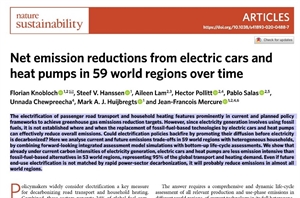Electric cars cut life-cycle carbon emissions almost everywhere and will contribute more savings as grids decarbonise
Mon 23 March 2020
View all news

A new study by an international group of researchers finds that electric cars already produce less carbon dioxide emissions in 53 of 59 world regions, representing 95% of global transport demand.
The analysis by Dutch and British researchers, published in Nature, finds that even if future end-use electrification is not matched by rapid power-sector decarbonization, it will probably reduce emissions in almost all regions of the world.
The study looks at the CO2 emitted in the production of electricity and in the manufacture of electric cars and finds a clear overall net benefit.
The study, using data from 2015, found that in countries such as Sweden, which gets most of its electricity from renewable sources, and France, which is largely powered by nuclear, the life-cycle CO2 savings from using electric cars were as high as 70% compared with their conventional counterparts. Estimates were then made for 2030 and 2050 under various policy scenarios.
In the UK, the savings in 2015 were calculated to be about 30%. That figure is expected to have improved significantly as the electricity grid has decarbonised (reducing carbon intensity by 45% from 2015 to 2019 according to DEFRA GHG figures). This will further improve in future as electric vehicles grow more efficient and the electricity grid is increasingly served by renewable energy.
Further savings are expected to arise from the fact that electric cars can help to balance electricity supply through 'smart charging'; drawing energy when there is a surplus (typically when renewable energy is in plentiful supply) and, potentially, providing energy back to the grid at periods of peak demand, reducing the need to introduce higher carbon forms of fast-response power generation. (
EV Energy Taskforce news link.)
Florian Knobloch of Nijmegen University in the Netherlands, the lead author of the study (reported in The Guardian) said: “The idea that electric vehicles or heat pumps could increase emissions is essentially a myth. We’ve seen a lot of disinformation going around. Here is a definitive study that can dispel those myths.”
Jean-Francois Mercure, of Exeter University, a co-author of the study, added: “The answer is clear: to reduce carbon emissions, we should choose electric cars and household heat pumps over fossil fuel alternatives.”
Related Links
< Back to news list